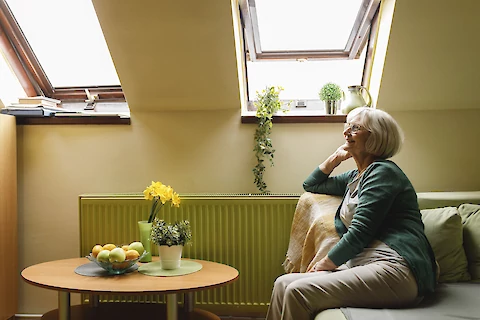
Seasonal affective disorder (SAD) is a type of depression that comes and goes with the seasons. It typically begins in late fall or early winter and subsides with the arrival of spring. This form of depression has unique traits, causes, and coping mechanisms that are critical for seniors and their caregivers to understand. Learn more about what SAD is, how it impacts seniors, and the ways to manage it effectively.
Understanding Seasonal Affective Disorder (SAD)
SAD is more than just "winter blues." It's a clinical type of depression triggered by changes in the seasons, particularly the transition from fall to winter. This shift leads to fewer daylight hours, potentially disrupting our circadian rhythm – our internal body clock – and leading to feelings of depression.
The Impact of SAD on Seniors
SAD can affect people of all ages, but seniors might be particularly vulnerable. SAD in seniors may manifest as increased fatigue, a loss of interest in previously enjoyed activities, changes in appetite or sleep patterns, or feelings of hopelessness. These symptoms can be exacerbated by the physical and social isolation that sometimes accompanies the winter months.
Coping Strategies for SAD
A few effective ways to cope with SAD include:
Light Therapy
Light therapy is one of the first-line treatments for SAD. This treatment involves sitting in front of a specialized light box for a set amount of time each day. It simulates natural outdoor light and can help improve mood and energy levels.
Cognitive Behavioral Therapy
Cognitive behavioral therapy (CBT) can also be effective. This form of therapy helps seniors reframe their negative thoughts about winter and learn coping skills to handle the symptoms of SAD.
Medication
Medication, specifically certain types of antidepressants, can be used under the supervision of a healthcare provider. They can help regulate mood and alleviate SAD symptoms. However, it's vital to discuss potential side effects and interactions with other medications with a healthcare provider before starting any new medication.
Lifestyle Changes
Natural methods, such as maintaining a healthy diet, regular physical activity, and engaging in social activities, can also help seniors manage their SAD symptoms. Proper nutrition can boost mood, while exercise promotes the production of endorphins, the body's natural mood lifters. Social interaction can also help to stave off feelings of loneliness and isolation that may intensify SAD symptoms.
The Importance of Seeking Professional Help
SAD is a serious condition that can significantly affect the quality of life, particularly for seniors. If you or a senior loved one are experiencing symptoms, do not dismiss them as mere "winter blues." Seeking professional help can be key in effectively managing this condition.
Senior Helpers Madison, NJ, Provides Support to Seniors Who Want to Age in Place
With understanding, proper treatment, and professional support, SAD can be manageable. If you live in Union, Westfield, Morristown, Madison, or Morris County and need assistance coping with SAD for yourself or a senior in your care, don't hesitate to reach out to Senior Helpers Madison, NJ. Our team of professionals is dedicated to providing attentive and compassionate care to seniors in our community. Let us help you navigate the winter months with ease.